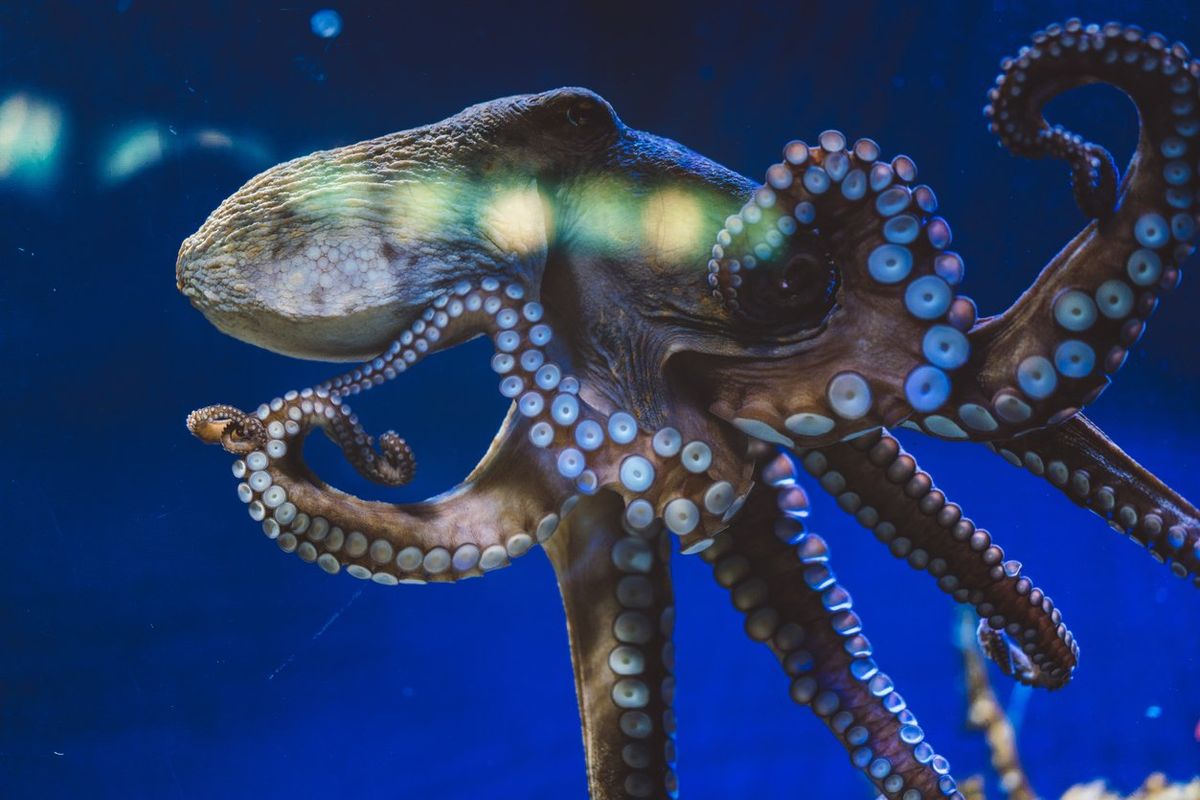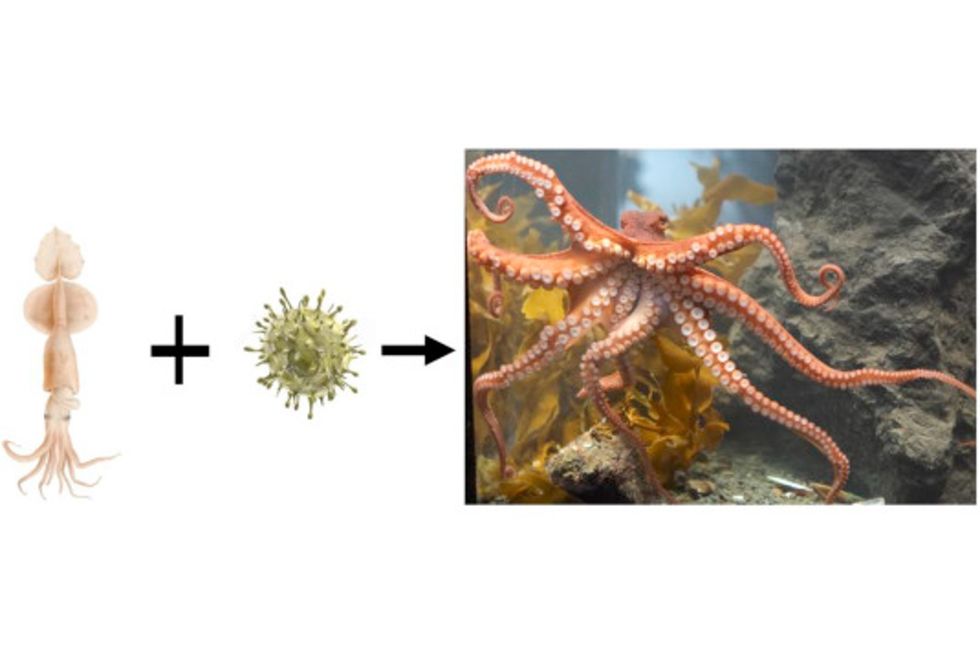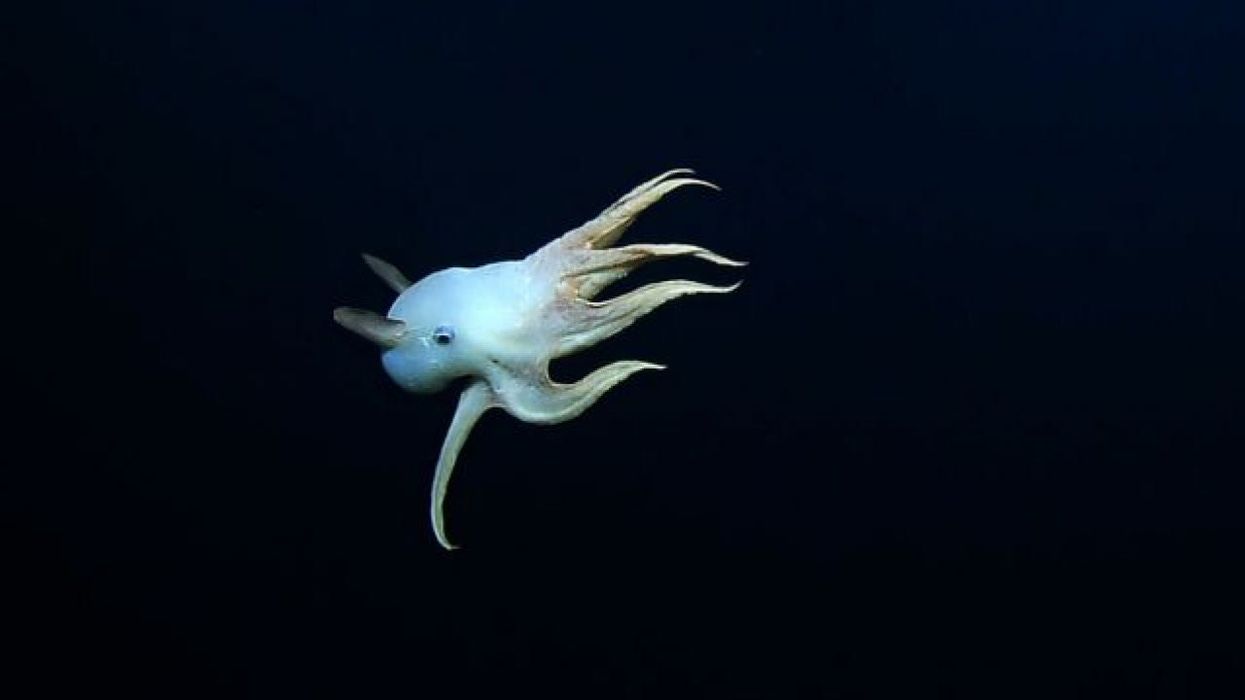Harriet Brewis
Dec 04, 2023
Rare video captures dumbo octopus using ears to travel the deep sea
Scripps News / VideoElephant
The more we learn about the ocean, the more it seems like an alien world, entirely distinct from our land-dwelling.
It is, therefore, perhaps unsurprising that scientists have sought explanations for the seas’ anomalies beyond the confines of our planet.
Enter the humble octopus – a creature so strange, that a group of researchers became convinced it came to Earth from elsewhere.
Such was their conviction that the tentacled animal is, in fact, an extraterrestrial, that they published a paper on it.
The study was led by Prof Chandra Wickramasinghe MBE, an astrobiologist who has spent decades trying to prove the theory of panspermia – that life on Earth originated elsewhere in the universe and that was carried here on meteoroids and comets.
His octopus-inspired research, which was conducted with the help of 31 fellow scientists, explores the possible causes of the Cambrian explosion, which denotes when a wide variety of animals burst onto the evolutionary scene around 350 million years ago.
The precise causes of this surge in biological diversity remain unknown but, as experts at the University have pointed out, “Cambrian life did not evolve in the blink of an eye”. Rather, it was preceded by many millions of years of evolution.
But that didn’t stop Prof Wickramasinghe and his colleagues from suggesting that the “explosion” may, instead, have been sparked by the arrival of alien microbes, whose influence is perhaps most evident in the emergence of the cephalopod.

“The genome of the Octopus shows a staggering level of complexity,” they note in the paper.
“Its large brain and sophisticated nervous system, camera-like eyes, flexible bodies, instantaneous camouflage via the ability to switch colour and shape are just a few of the striking features that appear suddenly on the evolutionary scene,” they add.
Such transformative genes “are not easily to be found in any pre-existing life form,” they continue.
“It is plausible then to suggest they seem to be borrowed from a far distant ‘future’ in terms of terrestrial evolution, or more realistically from the cosmos at large.”
“The evolution from squid to octopus is compatible with a suite of genes inserted by extraterrestrial viruses,” they go on, adding an… interesting graphic for illustration:

And if the idea of octopus-creating alien microbes wasn’t whacky enough, they then floated the idea of “an alternative extraterrestrial scenario.”
According to this second theory, “a population of cryopreserved octopus embryos” may have “soft-landed en mass from space 275 million years ago.”
Oh yes, they insist, “the possibility that [...] Squid and/or Octopus eggs, arrived in icy bolides several hundred million years ago should not be discounted.”
This, they argue, would be a “parsimonious cosmic explanation for the Octopus' sudden emergence on Earth ca. 270 million years ago.”
“Indeed this principle applies to the sudden appearance in the fossil record of pretty well all major life forms,” they add.
The authors then stress that a number of animals and organisms benefit from “unearthly” characteristics.
They cite the example of the fruit fly, whose eye structures are resistant to normally lethally damaging UV radiation, even though “this wavelength does not penetrate the ozone layer and is thus not evident as a Darwinian selective factor at the surface of the Earth.”

They therefore suggest that “the many features of biology that are not optimised to local conditions on the Earth” may be understood in the context of the “enlarged cosmic biosphere”.
Later on in the paper, they suggest that epidemics and pandemics – including the 1918 Spanish Flu and even HIV/AIDS – came about as the result of alien viruses.
They acknowledged that some diseases are clearly spread by person-to-person contact, but insisted that “if [the illness] is unexpected and explosive and on a large epidemic or pandemic scale then ‘in-fall from space’ should be one possible default first cause to fall under suspicion.”
The researchers ended their controversial paper by concluding that “mankind is now entering a historic paradigm-shifting moment in both our understanding of the evolution of life on Earth and the origins of the many pandemics that have exacted huge tolls on mankind in the recent past”.
Indeed, they continue: “All of us have contributed directly as co-authors of this paper because, in our considered opinion in confronting the wide range of scientific data, all the scientific and societal evidence seemingly points in one direction, an all-pervasive Cosmic Biology, mediated mainly by cometary transfers, being a driver for life on Earth.
“We believe the signs of this change are now so apparent that one of the biggest back-flips in the history of science is now on our doorstep.”
Sadly for them, their position isn’t shared by many. Here’s just a taste of what the scientific community had to say about their hypotheses:
Maybe one day, Prof Wickramasinghe and his team will have the last laugh but, for now, most people are just laughing.
Sign up for our free Indy100 weekly newsletter
Have your say in our news democracy. Click the upvote icon at the top of the page to help raise this article through the indy100 rankings
Top 100
The Conversation (0)














